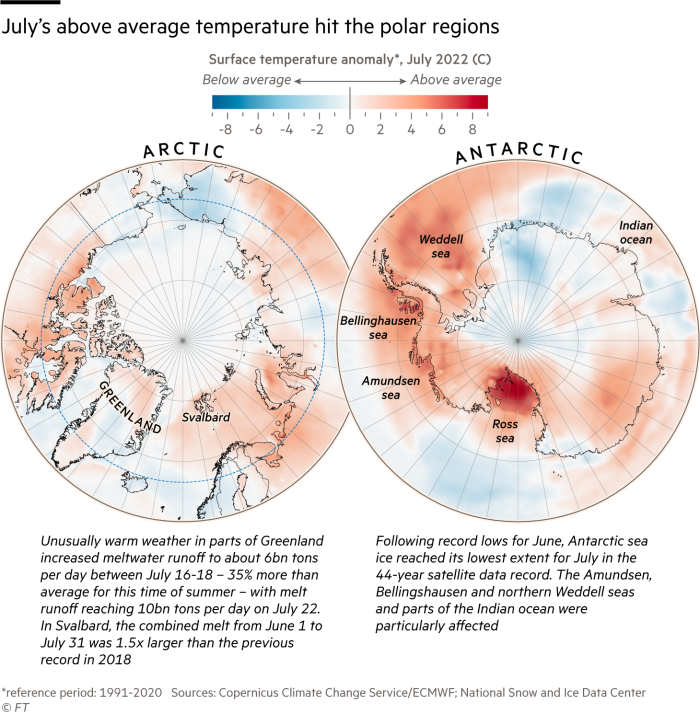Climate graphic of the week: Arctic melting four times faster than rest of the planet, study says

Scientists have warned that the Arctic is warming four times faster than the rest of the planet, and at a higher rate than previously thought, according to new research, while the Antarctic ice is also diminishing.
The research on the Arctic, published in the academic journal Communications Earth and Environment, studies data from as far back as 1979 when Arctic temperature estimates from satellites became available.
Scientists have for a long time known that the Arctic is heating faster than the rest of the planet, but have not agreed on a rate. The warming effect, along with long-term declines in sea ice levels, are considered two major indicators of climate change.
The most recent landmark Intergovernmental Panel on Climate Change signed off by 234 scientists from more than 60 countries estimated that the Arctic was only warming around twice as fast as the rest of the planet. Global temperatures have risen at least 1.1C since pre-industrial times.
High sea temperatures are also causing diminishing sea ice in Antarctica, as temperatures rise in the Bellinghausen, Amundell and Weddell seas.
The new research comes as record-breaking heat was experienced across parts of the globe last month, which ranked one of the three hottest Julys on record.
Globally, temperatures in July were 0.4°C above the 1991-2020 reference period, only marginally cooler than July 2019 and slightly warmer than July 2016, according to the Copernicus earth observation programme.
The heat was felt across the US, Europe and Asia, with Britain recording a record-high temperature of 40.3C and several French towns also declaring record high temperatures.
Scientists have identified a jet stream pattern dubbed “wavenumber 5” as responsible for making heatwaves across the globe more frequent and persistent.
The heat in Europe has swept upwards and exacerbated already rising temperatures in the Arctic Circle in July, scientists say, with hot air over Europe moved upwards over Greenland by an area of low pressure.
The weather pattern has contributed to high levels of meltwater from the Greenland ice sheet, where unusually warm days in the middle of the month prompted about 6bn tons of meltwater runoff from the ice sheet per day. The melt, which contributes to sea level rise, is an increase of 35 per cent compared with the usual average at this time of year.
Ted Scambos, of the National Snow and Ice Data Center based at the University of Colorado, Boulder, said the volume of meltwater lost from the Greenland sheet ice was above average for the month of July, but it was not record-setting.
“The loss of springtime snow cover in the northern hemisphere, and the loss of sea ice, particularly in the far northern Atlantic, is a bigger concern and has a bigger impact on the Greenland ice sheet,” said Scambos.
Mark Serreze, director at National Snow and Ice Data Center, said scientists were seeing overall loss of ice mass from the Greenland ice sheet. “There’s a lot more summer runoff occurring, and there’s evidence that there are more glaciers and icebergs being discharged into the ocean,” said Serreze.
The higher level of warming in the Arctic is due to the loss of snow and ice that accelerates warming by reducing the surface area of white cover that reflects the sun’s rays back into space. Instead, rays are absorbed into the earth or sea, causing more heating and in turn triggering more sea ice melt.
The Antarctic sea ice extent also reached its lowest value for July in the 44-year satellite data record, at 7 per cent below average, well below the previous record.
Zachary Labe, a researcher in oceanic and atmospheric sciences at Princeton, said that although the Arctic and Antarctic seemed remote to most people, changes in their temperature would affect places around the globe.
“Many of us are never going to visit those remote locations,” said Labe. “But these rapid changes in temperature have implications for all of us.
“We often describe the Arctic as the earth’s refrigerator, helping to keep the highest temperatures from rising,” said Labe. “So if you start really warming the Arctic and removing a lot of that ice, you’re going to have far reaching effects.”
Climate Capital

Where climate change meets business, markets and politics. Explore the FT’s coverage here.
Are you curious about the FT’s environmental sustainability commitments? Find out more about our science-based targets here
Share this news on your Fb,Twitter and Whatsapp
Times News Express:Latest News Headlines
Times News Express||Health||New York||USA News||Technology||World News
